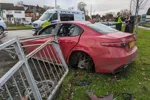Marshall Motor Holdings has a delicate integration task on its hands after its acquisition of Ridgeway Garages.
Yet there is no reason to rush. Industry executives regard Ridgeway as a strong-performing business with a respected workforce. One management source said Marshall is aware how highly Ridgeway’s staff regarded their energetic and charismatic leaders, chief executive John O’Hanlon and chairman David Newman, who stepped down after the sale. The source said Marshall would tread “slowly and carefully”.
Marshall has only recently integrated SG Smith, bought last November.
At a cost of £106.9 million, the Ridgeway takeover is the highest cost deal since 2010. There are clear geographical and brand considerations behind it. Ridgeway bridges the gap from Marshall’s heartland in East Anglia and East Midlands to its outlying dealerships in the West Country.
AM understands Ridgeway chairman David Newman was approached informally by another prospective buyer, which led Marshall to prepare its own bid. Marshall chief executive Daksh Gupta knows the Newbury-based premium brand dealer group well. He was briefly its managing director in 2008, before joining Marshall. After that, Gupta retained a non-executive role on Ridgeway’s board.
He stepped down from that role before beginning negotiations to buy Ridgeway.
Gupta said: “David Newman and his team have built an excellent business with fantastic senior management, great staff, strong performance and a similar culture to MMH.”
It is believed to be the fourth-biggest acquisition ever, behind the £504.2m paid by Pendragon to take over top 10 AM100 rival Reg Vardy in 2006, Inchcape’s £262.9m purchase of European Motor Holdings in 2007, and the £231.5m paid by Pendragon for CD Bramall in 2004.
Marshall funded the Ridgeway deal from its existing balance sheet capabilities, through releases of equity in stock and its leasing book, and expects it to create a significant uplift in profits.
The expected benefits include the additional choice that Marshall can offer customers, and increased career development opportunities for staff.
“Lots of what Ridgeway does is first-class, such as its social media presence. We will take what each party does best and roll them out across the new expanded business,” Gupta added.
The Ridgeway name will be retained until Marshall branding is introduced to the acquired sites in 2017/2018.
“We will take what each party does best and roll them out across the new expanded business” Daksh Gupta, Marshall
Marshall chief financial officer Mark Raban said: “This is massively significant in its earnings-per-share potential since we’re adding a business that, from a profitability perspective, is not that far off Marshalls. Last year, we made £23m EBITDA, Ridgeway just over £20m. So, it is almost doubling our earnings. It is transformational in terms of shareholder benefit.”
The positive outlook on performance, he said, was based on Ridgeway as a respected brand, in “great” locations, with more than 2% return on sales.
An industry analyst told AM that Marshall can now claim almost national coverage, which brings with it the challenges of complexity and maintaining effective management across a wide variety of brands and geography.
He added: “Over the past few years, there has been a slow, but steady, improvement in profitability, albeit from a low base.”
For four years out of the past 10, Marshall has had a return on sales (RoS) figure of near 0%. However, from breakeven in 2011, profits have climbed steadily to an RoS figure of 1.2% in 2015, despite its acquisitions being either neutral – Crystal Motor Group made an RoS of 1.3% in 2013, or challenging – Silver Street lost money prior to acquisition.
The analyst said: “Ridgeway, by contrast, has occasionally turned in an RoS at or above the fabled 2%. For the last three years, RoS has been around 1.5%, better than Marshall.
“In terms of franchise fit and geography, profitability and management resource, Ridgeway will undoubtedly be good for Marshall. Whether Marshall will be good for Ridgeway depends on the new combined management coping with the increase in complexity and developing the synergies that are available.”
Marshall has already announced new roles for some Ridgeway executives: operations director John Head becomes commercial director, and finance director Dan Taylor keeps the same role at Marshall, reporting to Raban.
Taking into account the amount of capital on its balance sheet, following its IPO, Marshall’s return on capital employed was just under 10%. In 2017, Raban said it will be more than 20%.
Ridgeway
■ 2015 financials: £722.6m turnover, £20.2m EBITDA, 2.1% RoS
■ Franchises: Audi (2), BMW/Mini (3), Jaguar (1), Land Rover (1), Maserati (1), Mercedes-Benz Cars (4), Mercedes-Benz Commercials (4), Škoda (3), Smart (3), Volkswagen Passenger Cars (4) and Volkswagen Commercial Vehicles (2).
■ Other businesses: Ridgeway Select used car centres (5), TPS trade parts depots (2), bodyshops (2), standalone PDI centre.
■ Founded in 1997 by David Newman with a single Volkswagen outlet on the carmaker’s sponsored retailer programme.













Login to comment
Comments
No comments have been made yet.